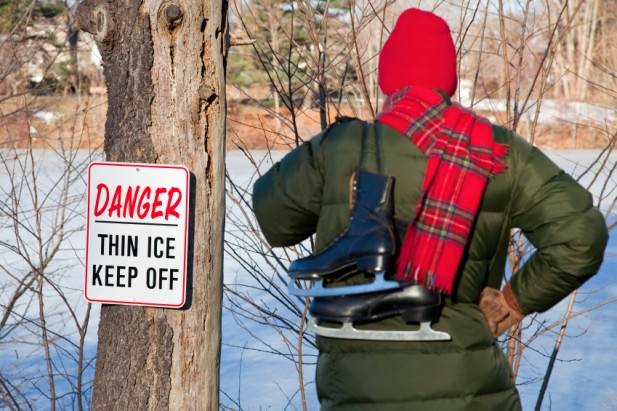Being Safe Around Thin Ice: Checking Ice Conditions

Whether it is ice skating, ice fishing, or the newest winter trend of kite skiing, Canadians have always enjoyed venturing out onto frozen lakes or ponds. While these activities can bring countless hours of family fun, it is important to be aware of the potential dangers of venturing out on ice.
Ice is never 100% safe. However, there are times when it is less safe than others. Before stepping foot on ice, you should always check the temperature outside. It is important to think in terms of temperature rather than dates when deciding if ice is safe. The winter of 2015-2016 has been uncharacteristically mild and just because the ice was safe this time last year does not mean it will be safe again this year.
Even if there are cold temperatures, other factors can also affect ice conditions. The wind can create a wave action in the water causing ice to break up. Additionally, many believe that snow on a frozen surface makes the ice surface stronger. This is a myth. Snow acts as an insulting blanket and can actually hinder ice formation and growth. A sudden drop in air temperature can also affect ice stability as it can create cracks to form in the ice. Even ice that appears thick can be weak. This is known as “rotten ice.” This ice has frozen and thawed repeatedly, making it potentially fragile even when it appears solid.
While some sections of ice may appear to be stable, ice conditions can vary drastically and within close proximity. When in doubt about ice conditions, do not venture out! You can always contact local ice fishing hut providers for the latest conditions as they perform ice-thickness checks daily.
Written By

Liane is committed to representing individuals who have suffered serious personal injuries and to families who have suffered the losses of loved ones. Liane holds a Juris Doctor from the University of Windsor, where she received the Torkin Manes Cohen and Arbus award for combined academic achievement and service to the community, and the Charles J. Clark scholarship for academic excellence and involvement in community and volunteer activities. She was called to the bar in 2013.
